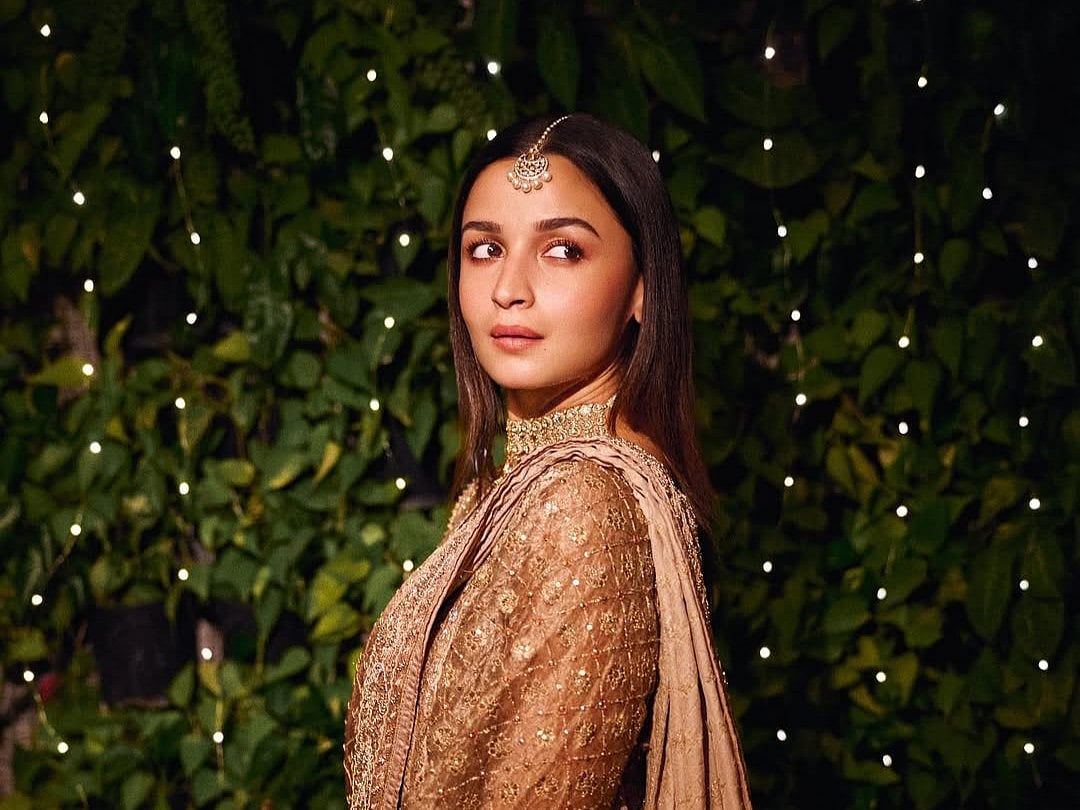Alia Bhatt's Diwali saree has a 30-year-old story—here's how to keep your heirlooms shining
The saree is intricately embroidered with silver tikki work in delicate floral patterns

A Kapoor family gathering is never just a family gathering. It's a series of fashion moments. When Kareena Kapoor Khan hosted her annual festive bash at her Mumbai home, the guest list was Bollywood royalty — and Alia, married to Kareena’s cousin Ranbir Kapoor, was dressed in stunning gold.
Styled by Rhea Kapoor, Alia wore a rose-gold silk saree from Ritu Kumar’s archives, a piece so special it first came to life over three decades ago. The saree, intricately embroidered with silver tikki work in delicate floral patterns, has old-world charm with a modern edge. Rhea described it best: “Remembering the Silk Road… a piece of fashion history preserved in thread.”
But leave it to Alia to make history so good. She paired the drape with a sleeveless bustier blouse featuring a plunging neckline, and threw on a matching embroidered jacket for that extra bit of flair — part regal, part rockstar.
For accessories, she kept the sparkle coming with a gold choker, maang tika, and stacked rings, while her makeup stayed soft and glowy — rose-gold eyeshadow, pink lips, and blush-tinted cheeks, all framed by centre-parted, loose waves.
On Instagram, Alia summed it up with a caption as playful as her vibe: “fam jam x diwali glam.” Her photos with Kareena, Karisma, Neetu Kapoor, Alekha Advani, and Anissa Malhotra were pure family goals — and proof that when the Kapoors do Diwali, they don’t just light diyas, they light up the room.
How to preserve your heirloom sarees
If you’re lucky enough to own a heritage saree like Alia Bhatt’s rose-gold Ritu Kumar drape, you’re holding a piece of art — one that deserves as much care as admiration. Sarees, especially those crafted from silk or embellished with zari and tikki embroidery, are highly delicate and need thoughtful maintenance to stand the test of time. Here’s how to keep your treasured pieces as luminous as the day they were woven.
Let your saree breathe
According to The Loom blog, the most common mistake is storing sarees in plastic covers. Instead, wrap each saree in muslin or cotton cloth to let the fabric breathe naturally and prevent moisture build-up. Avoid airtight containers or synthetic bags, which can trap humidity and lead to mildew.
Refold regularly
Experts from Kalamandir and Exotic India recommend refolding your sarees every three to six months. This prevents permanent creases, especially in zari or embroidered areas. Changing the folds also ensures the fabric doesn’t weaken along one line over time.
Keep zari and silver embroidery shining
For sarees with metallic detailing — like Alia’s silver tikki embroidery — store them with acid-free tissue paper or anti-tarnish sheets, as suggested by Sttylme. These materials protect delicate work from oxidation and dullness. Including a few silica gel packets can help absorb any residual moisture.
Avoid sunlight, seek softness
Store your sarees in a cool, dark, and dry place. Direct sunlight can fade dyes and damage delicate fibers. You are advised against hanging sarees for long periods, as the weight can distort the weave — instead, fold them neatly and lay them flat.
Go natural against pests
To protect against silverfish or moths, The Loom recommends using natural repellents like neem leaves or cloves. These are gentle alternatives to chemical mothballs, which can leave harsh odors and stains.
Caring for your sarees is not just a maintenance ritual — it’s a way of honouring craftsmanship and cultural legacy. When stored with intention, your sarees can become heirlooms that travel through generations — each fold telling a story of artistry, heritage, and timeless style.
Network Links
GN StoreDownload our app
© Al Nisr Publishing LLC 2026. All rights reserved.